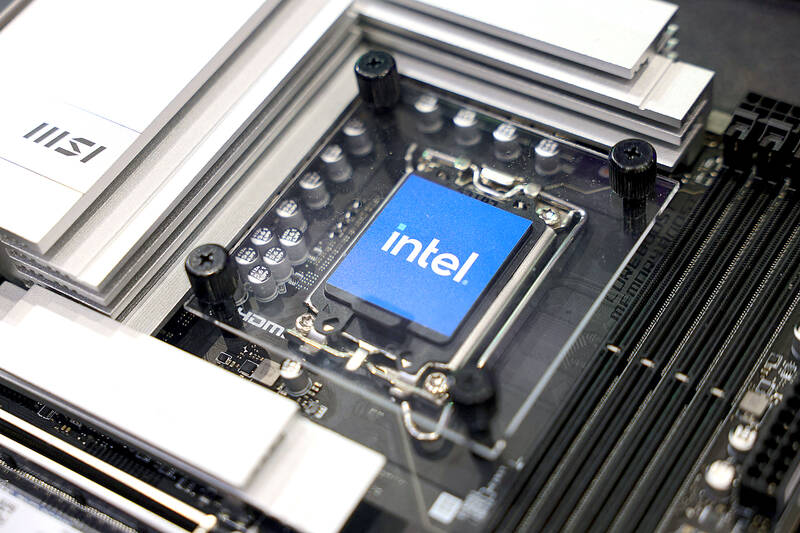Intel Corp is to spin off assets that are not central to its mission and create new products including custom semiconductors to try to better align itself with customers,
chief executive officer Lip-Bu Tan (陳立武) said on Monday.
The US chipmaker needs to replace the engineering talent it has lost, improve its balance sheet and better attune manufacturing processes to meet the needs of potential customers, Tan said.

Photo: I-Hwa Cheng, AFP
Speaking at his first public appearance as CEO, at the Intel Vision conference in Las Vegas, Tan did not specify what parts of Intel he believes are no longer central to its future.
“We have a lot of hard work ahead,” he said, addressing the company’s customers in the audience. “There are areas where we’ve fallen short of your expectations.”
The veteran semiconductor executive is trying to restore the fortunes of a company that dominated an industry for decades, but now finds itself chasing rivals in most of the areas that define success in the field. A key question confronting its leadership is whether a turnaround is best served by the company remaining whole or splitting up its key product and manufacturing operations.
Tan gave no indication that he would seek to divest either part of Intel. Instead, he highlighted the problems he needs to fix to get both units performing more successfully.
Intel’s chips for data center and artificial intelligence (AI)-related work in particular are not good enough, he said.
“We fell behind on innovation,” he said. “We have been too slow to adapt and meet your needs.”
Tan, 65, assumed the role on March 18. He had been an Intel board member before stepping down in August last year.
The CEO said he has been asked why he took on the job this late in his career.
“It was very hard for me to see it struggle,” Tan said. “I simply could not stay on the sidelines knowing that I could help.”
Tan’s predecessor, Pat Gelsinger, was pushed out by the board for a perceived failure to rejuvenate Intel’s product lineup. One of the most glaring challenges: creating an AI accelerator chip to rival the products of Nvidia Corp. That company, once in Intel’s shadow, has seen its revenue and valuation skyrocket over the past two years due to the AI computing boom.
Gelsinger had also set out to turn Intel into a chip foundry — a contract manufacturer that makes products for outside clients — but that effort is still in its early stages.
Tan said the company needs to listen to prospective outside customers for its factories and let them specify the design and manufacture of their products, rather than Intel dictating the way it would be done.
He said many large customers want custom parts — and his company will do it for them.
The CEO repeatedly emphasized that there is no quick fix to Intel’s problems, but that he is committed to staying at the company as long as it takes.
“It won’t happen overnight, but I know we can get there,” he said.

South Korea’s equity benchmark yesterday crossed a new milestone just a month after surpassing the once-unthinkable 5,000 mark as surging global memory demand powers the country’s biggest chipmakers. The KOSPI advanced as much as 2.6 percent to a record 6,123, with Samsung Electronics Co and SK Hynix Inc each gaining more than 2 percent. With the benchmark now up 45 percent this year, South Korea’s stock market capitalization has also moved past France’s, following last month’s overtaking of Germany’s. Long overlooked by foreign funds, despite being undervalued, South Korean stocks have now emerged as clear winners in the global market. The so-called “artificial intelligence

‘SEISMIC SHIFT’: The researcher forecast there would be about 1.1 billion mobile shipments this year, down from 1.26 billion the prior year and erasing years of gains The global smartphone market is expected to contract 12.9 percent this year due to the unprecedented memorychip shortage, marking “a crisis like no other,” researcher International Data Corp (IDC) said. The new forecast, a dramatic revision down from earlier estimates, gives the latest accounting of the ongoing memory crunch that is affecting every corner of the electronics industry. The demand for advanced memory to power artificial intelligence (AI) tasks has drained global supply until well into next year and jeopardizes the business model of many smartphone makers. IDC forecast about 1.1 billion mobile shipments this year, down from 1.26 billion the prior

People stand in a Pokemon store in Tokyo on Thursday. One of the world highest-grossing franchises is celebrated its 30th anniversary yesterday.

NEW IDENTITY: Known for its software, India has expanded into hardware, with its semiconductor industry growing from US$38bn in 2023 to US$45bn to US$50bn India on Saturday inaugurated its first semiconductor assembly and test facility, a milestone in the government’s push to reduce dependence on foreign chipmakers and stake a claim in a sector dominated by China. Indian Prime Minister Narendra Modi opened US firm Micron Technology Inc’s semiconductor assembly, test and packaging unit in his home state of Gujarat, hailing the “dawn of a new era” for India’s technology ambitions. “When young Indians look back in the future, they will see this decade as the turning point in our tech future,” Modi told the event, which was broadcast on his YouTube channel. The plant would convert